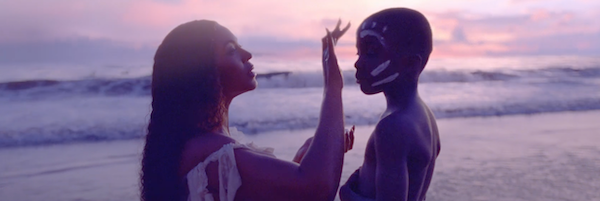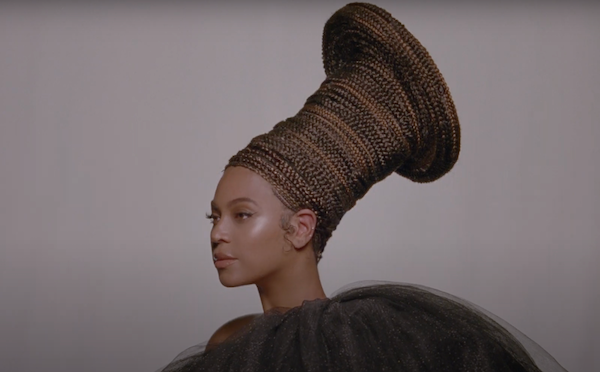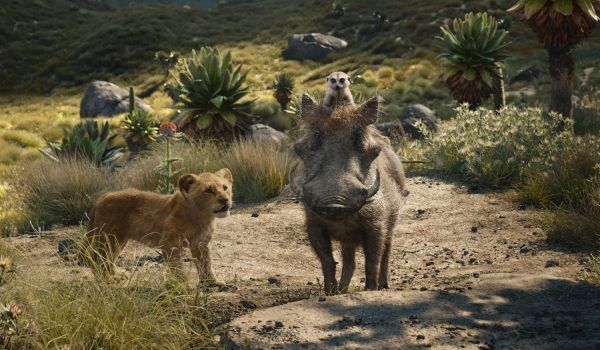When Disney made the surprise announcement that Beyoncé’s Black Is King would be coming to Disney+, the company’s highly touted direct-to-consumer platform, it was described as a “visual album,” essentially serving as a lavish accompaniment to The Gift, her tie-in album to last year’s Lion King remake. But that is selling Black Is King short. It’s much more than a mere “visual album” (her first since 2016’s masterful Lemonade) and is certainly more than an elaborate tie-in to an album that didn’t exactly make waves. The feature-length Black Is King is, instead, an oversized celebration of Blackness and the ultimate statement and expression of Beyoncé as an artist. It also feels like the new version of The Lion King that modern audiences really deserved.
As far as a narrative throughline goes, it follows similar beats from The Lion King (the last image is a young king being hoisted into the air, even), with a young ruler growing up in Africa and facing adversity. Beyoncé and her small army of co-directors double down on the biblical imagery and allusions of the animated film (and, to a lesser extent, Jon Favreau’s computer animated redo); the opening of the movie features footage of a basket (the kind little baby Moses was tucked into) as it whooshes down an African river. From there, Black Is King is presented as a series of kaleidoscopic, deeply mesmerizing musical numbers featuring Beyoncé and a host of her key collaborators (and an array of very special guests).
Black Is King is a fascinating, sometimes overwhelming mélange – of beautiful, breathtaking images, astounding musical numbers, poetic spoken-word interludes, and snippets of dialogue from the new Lion King (it is admittedly jarring to hear Billy Eichner, channeling a talking meerkat in the middle of all of this). It is a staggering accomplishment, one in which all forms of Blackness form its joyous, multifaceted centerpiece. Beyoncé has been cultivating and expanding her artistic reach in recent years, from her stage shows to behind-the-scenes documentaries and her pioneering “visual albums.” And Black is King feels like an artist working at the height of her powers, doubling down on things that she knows work very well (intricately staged tableaus, slow motion, beautiful people posing) while also pushing herself into some uncomfortable, but absolutely necessary, territory – the sheer range of Black experiences and faces is absolutely staggering and her visual palette has grown to include African patterns, iconography, and a fair amount of odes to the continent’s diverse wildlife (lions obviously included).
It’s also important to note how Beyoncé is. (Think about her walking down the street with the baseball bat, exacting her revenge.) That sense of humor has made its way to Black is King. Yes, it is profound and profoundly important. But it’s never humorless or self-serious. There’s a moment, in maybe the most raise-the-roof sequence (set to “Mood 4 Eva”) that features Beyoncé and Jay-Z sitting in front of the TV, frozen dinners unwrapped in front of them, everything in the room screaming excessive opulence. This is the same sequence that features the movie’s lone white face – a butler who brushes the young king’s teeth. Excellent.
Among the collaborators Beyoncé recruited for the project and who appear onscreen include African artists Yemi Alade, Lord Afrixana, and Shatta Wale, whose appearances alongside Naomi Campbell, Lupita Nyong’o, Kelly Rowland (late of Beyoncé’s old band Destiny’s Child) and, of course, Blue Ivy (who nearly steals the entire movie with her multiple appearances) and Beyoncé’s mom Tina Knowles, don’t feel out of place or inappropriate. (Notably missing: Kendrick Lamar, who has a star verse on the album standout “Nile.”) The type of performers and faces that appear on screen, from Black albinos to dark-skinned Indians, from movie stars to family members, contribute to the melting pot eccentricity of the project and its unifying theme of Blackness being something that transcends everything else. While Beyoncé has clearly been working on this project for a very long time, given recent events, this sentiment is made even more essential.
At some point during Black Is King, it becomes very apparent that this, and not Favreau’s overstuffed, slavishly devoted remake, is what the new Lion King should have been. Julie Taymor’s Broadway production of The Lion King took the essence of the animated film’s story and expanded and elaborated on it, incorporating more African sounds and culturally specific iconography, to create something wholly new and utterly electrifying. It was shocking and wholly unique; identifiably Lion King but modernized and made more complex and specific (and therefore more universal). Black is King does the same thing, to an even more essential degree. The official Disney+ description of the project states that the superstar “reimagines the lessons of The Lion King for today’s young kings and queens in search of their own crowns.” And while that synopsis is kind of hokey, it’s also true – throughout, Beyoncé refers to kings and queens not as specific royalty, but as any young Black person trying to make it through this cruel and ugly world. It’s an incredible sentiment and would have been a timely update of the classic Lion King themes. Unfortunately, they went with the eerily realistic warthog route.
The fact that Black Is King is debuting on Disney+ at all feels especially brave. It’s debuting more than a year after Favreau’s The Lion King, so the synergistic demands aren’t as pressing (although, of course, an expanded version of The Gift drops today and includes the movie’s closing credits banger “Black Parade”). And, more pressingly, this is a platform that, historically, has shied away from anything even remotely controversial. They covered Daryl Hannah’s bare butt in Splash using the same digital fur technology that was used on Cats and kicked Love, Victor to Hulu because they deemed its cuddly queerness too racy. But here they are, debuting a 90-minute ode to Blackness, during a time of fiery racial debate. This is a movie with bold African imagery, including some near-nudity (gasp!) and moments that, I’m sure, made somebody uncomfortable. Sure, Black is King is the passion project of the biggest pop star in the world and ties into one of the company’s most beloved properties. But it’s also a bold, boundary-pushing, occasionally cosmic ride through the continent (one review rightfully described it as Tree of Life meets Black Panther). It’s embracing and accepting and empathetic. And that could alienate those with narrower views of what Disney+ should be. Instead, Black Is King rebuffs the squarish notions of Disney+. Instead, it shows us what the platform could be. And that is pretty powerful.
Grade: A
Black Is King is now streaming exclusively on Disney+.



